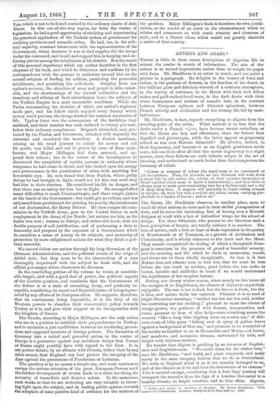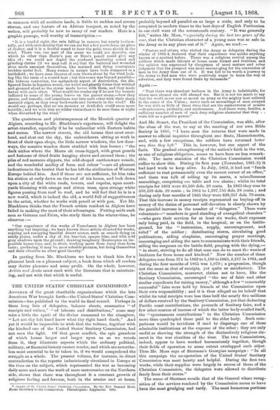ARTISTS AND ARABS.*
THERE is little in these sunny descriptions of Algerian life to attract the reader in search of information. The aim of the
author is to record impressions, rather than to weight his pages with facts. Mr. Blackburn is an artist in words, and can paint a picture in a paragraph. He delights in the beauty of form and colour, in the perfume of flowers, in the freedom of the desert, in the brilliant glow and delicious warmth of a southern atmosphere, in the variety of costumes, in the Moors with their rich silken sashes aud gold-embroidered vests, in the dark Arabs with their white bournouses and turbans of camel's hair, in the contrast between European ugliness and Oriental splendour, between French activity and civilization and the dreamy life led by semi- barbarians.
Mr. Blackburn, in fact, regards everything in Algeria from the
standing-point of the artist. What matters it to him that the Arabs under a French re"yinze have become arrant swindlers, or that the Moors are lazy and effeminate, since the former look
dignified and picturesque, while the latter appear as gorgeously attired as was ever Haroun Alraschid? He alludes, indeed, to their degeneracy, and laments it as an English gentleman needs must, but one feels after all that this moral degeneracy is a slight matter, since these fellows are such infinite adepts in the art of dressing, and understand so much better than their Conquerors the harmony of colour.
"Colour or contrast of colour [he says] seem to be considered or felt everywhere. Thus, for instance, no two Orientals will walk down a street side by side unless the colours of their costume harmonize or blend together (they seem to know it instinctively); and thou there is always grey or some quiet contrasting tone for a background, and a sky of deep, deep blue. A nogresa will generally be found selling oranges or citrons ; an Arab boy with a rod fez and white turban carrying pur- ple fruit in a basket of loaves ; and so on."
The Moors, Mr. Blackburn observes in another place, seem to excel all other nations in taste and in their skilful juxtaposition of tints, and he notes the interesting fact of having seen a Moorish designer at work with a box of butterflies' wings for his school of design. Yet these Orientals, who possess in one direction such a keen perception of beauty, are totally without it in another. The love of nature, such a love at least as finds expression in the poetry of Wordsworth or of Tennyson, is a growth of civilization and Christianity, and is wholly unknown to the Arab and the Moor. They cannot comprehend the feeling of which a thoughtful Euro- pean is conscious in the presence of grand or beautiful 'scenery, and the meaning and life which he finds in mountains, woods, and rivers are to them wholly inexplicable. So true is it that Nature does not educate men to love her, that we must be wise before she can teach us wisdom, good before she can make us better, humble and child-like in heart if we would understand the significance of her simplest lessons.
During our dreary winter season, when merely to live taxes all the energies of an Englishman, the climate of Algiers is exquisitely enjoyable. The sun is hot indeed, but the breeze is fresh, the sky is blue, and nature holds her carnival. Pleasant it is to read of bright December mornings, "neither too hot nor too cold, neither too enervating nor too exciting ;" pleasant to scent the odours of orange groves, the perfume of wild flowers, honeysuckles, and roses ; pleasant to hear of aloe hedge-rows stretching across the country "like a long blue rippling wave on a calm sea," of deli- cate stems of lofty grass "falling over in spray of golden leaves against a background of blue sea," and pleasant to be reminded of the nature so familiar to us in Devonshire and Vales,—of farms, and meadows, and mountain streams, surrounded by hills, and bright with delicious verdure. No wonder that Algiers is profiting by an invasion of English- men and Englishwomen. "We settle down for the winter here," says Mr. Blackburn, "and build, and plant vineyards, and make merry in the same romping fashion that we do in Switzerland. We write to England about it as if the country belonged to us, and of the climate as if we had been the discoverers of its charms." This is natural enough, considering that a four days' journey will transport the traveller from the fogs of a London November to a healthy climate, to bright sunshine, and to blue skies. Algeria,
• Arthts Arabs; or, Sketching in Sunshine.
in common with all southern lands, is liable to sudden and severe storms, and one feature of an African tempest, as noted by the writer, will probably be new to many of our readers. Here is a graphic passage, well worthy of transcription :—
" It is a fearful sight, the rain falling in masses, but nearly horizon- tally, and with such density that we can see but a few yards from our place of shelter, and it is a fearful sound to hear the palm trees shriek in the wind. There was one part of the scene we could not describe, one which no other than Dante's pen or Dore's pencil could give any idea of ; we could not depict the confused muttering sound and grinding elatter (if we may call it so) that the battered and wounded aloes made amongst themselves, like maimed and dying combatants trodden under foot. Many scenes in nature have been compared to a battlefield ; we have seen sheaves of corn blown about by the wind look- ing like the tents of a routed host ; but this scene was beyond parallel— the hideous contortion, the melancholy aspect of destruction, the dis- figured limbs in hopeless wreck, the weird and ghastly forms that writhed and groaned aloud as the storm made havoc with them, and they made havoc with each other. What would the reader say if he saw the wounds inflicted by some of the young leaves on the parent stems,—how they pierce, and transfix, and sometimes saw into each other with thoir sharp serrated edges, as they sway backwards and forwards in the wind ? He would say, perhaps, that no sea monster or devil-fish could seem more horrible ; and we wish him no wilder vision than to be near them at night when disturbed by the wind."
The quaintness and picturesqueness of the Moorish quarter of Algiers, according to Mr. Blackburn's experience, will delight the artist-traveller, especially if he be unfamiliar with Eastern habits and scenes. The narrow streets, the old houses that meet over- head, and shut out the sky, the embroiderers sitting at work in front of their open shops, the little narrow windows, the low door- ways, the massive wooden doors studded with iron bosses ; "the dark niches where the Moors sit cross-legged, with great gourds and festoons of dried fruits hanging above and around them ; the piles of red morocco slippers, the odd-shaped earthenware vessels, and the wonderful medley of form and colour "—are all pleasant indications to the tourist that he has left the civilization of Western Europe behind him. And if these are not sufficient, let him take his station at early dawn on the roof of his house, and look down upon a city of flat white roofs, towers, and cupolas, upon court- yards blooming with orange and citron trees, upon strange white figures passing from roof to roof, and he will feel that he is in a new world, which is indeed the old, a world full of suggestiveness to the artist, whether he works with pencil or with pen. Yet Mr.
Blackburn thinks that the French artists resident in Algiers have failed in making the most of their advantages. Putting aside such men as Gerome and Frere, who study there in the winter-time, he observes :—
" Onr experience of the works of Frenchmen in Algiers has been anything but inspiring ; we have known these artists closeted for weeks, copying and recopying fanciful desert scenes, such as camels dying on sandy plains, under a sky of the heaviest, opaque blue, and with cold grey shadows upon the ground ; drawing imaginary Mauresques on im- possible house-tops, and, in short, working more from fancy than from facts ; producing, it may be, most saleable pictures, but doing themselves and their clienales no other good thereby."
In parting from Mr. Blackburn we have to thank him for a pleasant book on a pleasant subject, a book from which all readers may derive pleasure and some profit. On the whole, however, Artists and Arabs must rank with the literature that is entertain- ing, and not with that which is useful.































 Previous page
Previous page